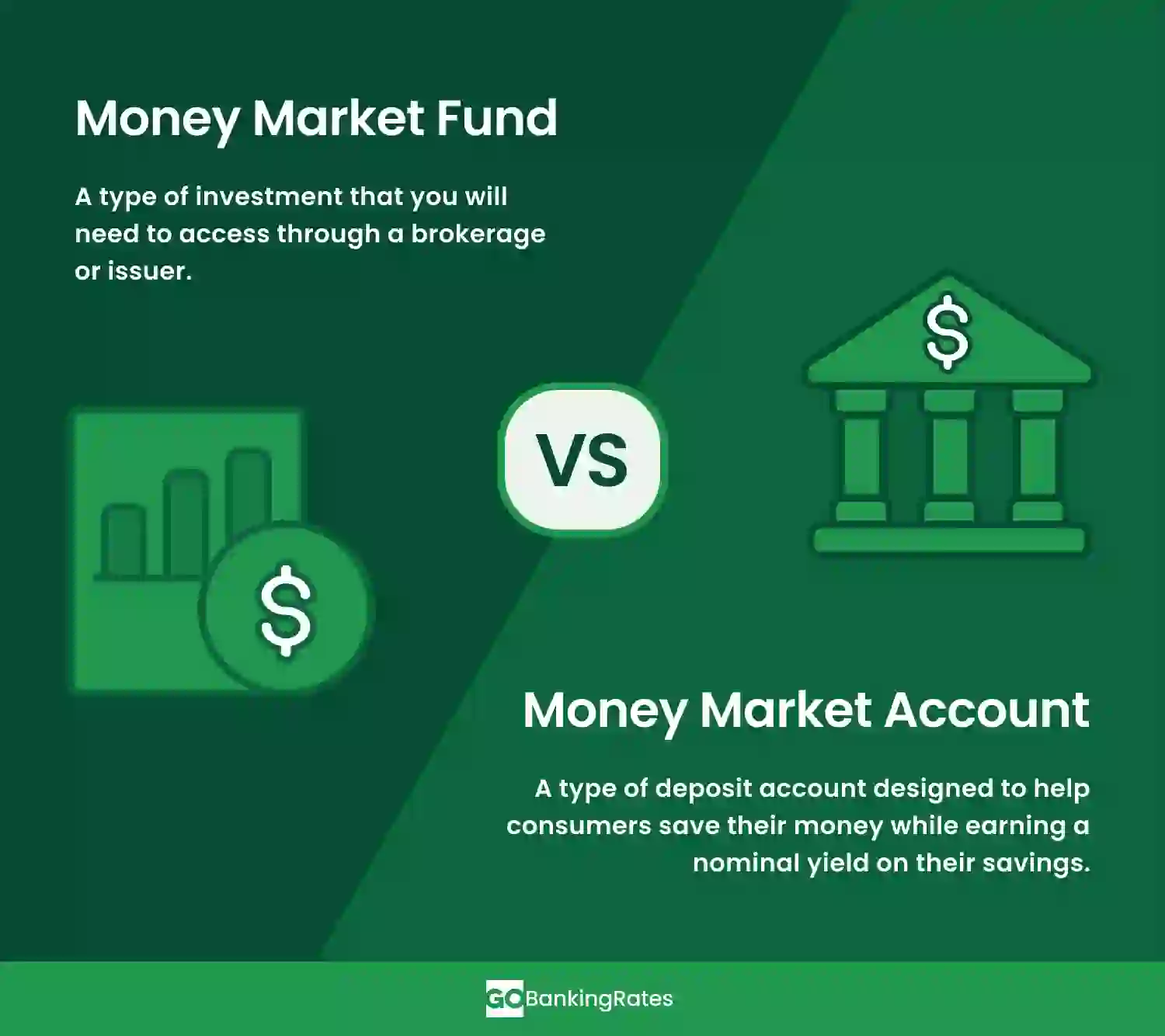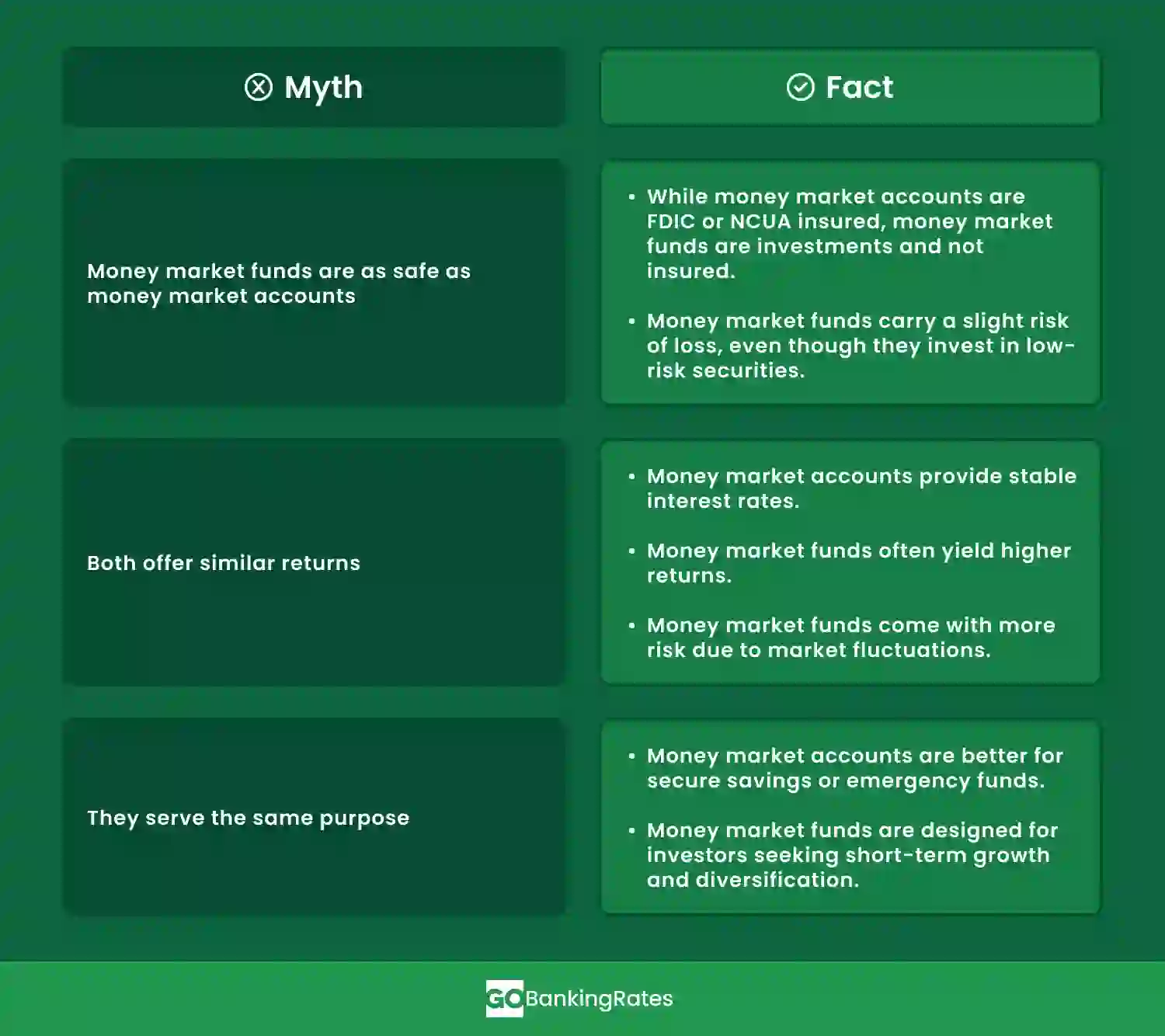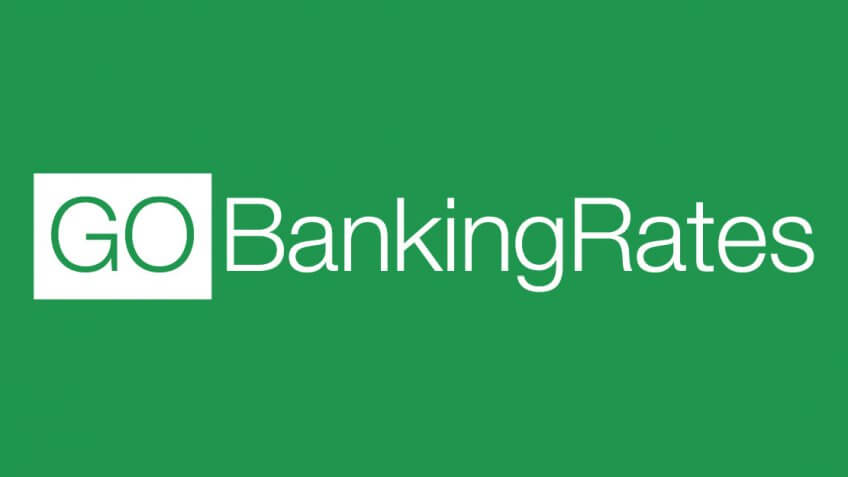Money Market Account vs. Money Market Fund: What’s the Difference?

Commitment to Our Readers
GOBankingRates' editorial team is committed to bringing you unbiased reviews and information. We use data-driven methodologies to evaluate financial products and services - our reviews and ratings are not influenced by advertisers. You can read more about our editorial guidelines and our products and services review methodology.

20 Years
Helping You Live Richer

Reviewed
by Experts

Trusted by
Millions of Readers
A common question in the personal finance industry tends to be: “Is a money market fund the same as a money market account?” While some might think the two types of accounts are very similar, that is not actually the case.

What Is a Money Market Account?
Money market accounts are a type of savings deposit account available at banks, credit unions and other financial institutions. As deposit accounts, they come with FDIC or NCUA insurance up to $250,000. They also tend to offer higher yields compared to traditional savings accounts.
In many cases, money market accounts come with checks and debit cards, making it convenient for you to withdraw your money. However, keep a close eye on withdrawal limits. Although some banks allow unlimited withdrawals, others charge a fee after six transactions per month.
What Is a Money Market Fund?
A money market fund is a type of investment account. These funds typically invest the brunt of their assets in debt securities with short maturities, meaning there’s minimal risk. Due to this, these are some of the least volatile mutual funds you can own.
As an investment, money market funds are not protected by FDIC, NCUA or any other federal agency. You also won’t have access to checks or a debit card. Instead, you’ll need to sell your investment through a brokerage or issuer if you need to access your money.
Key Differences Between Money Market Accounts vs. Money Market Funds
The differences between these two accounts are related to accessibility, earnings, risk and insurance. Check out the chart below to learn more about the differences between money market accounts vs. money market funds.
| Feature | Money Market Account | Money Market Fund |
|---|---|---|
| Insurance coverage | FDIC or NCUA — up to $250,000 per depositor | None |
| Access to account balances | Varies; limited to six withdrawals per statement cycle at many banks | Unlimited |
| Debit card | Yes | Sometimes |
| Check writing | Yes | No |
| Interest accrual | Yes | Yes; higher than that of money market accounts |
Pros and Cons of Money Market Accounts
Here are the benefits and drawbacks of money market accounts:
Pros
- Earn a higher yield than traditional savings accounts.
- Write checks and use a debit card.
- Easily access your funds.
- FDIC or NCUA insurance up to $250,000.
Cons
- You may only be able to make up to six withdrawals per month without a fee.
- Minimum balance requirements often apply.
- The bank may charge a fee if you don’t meet the minimum balance requirements.
Pros and Cons of Money Market Funds
Money market funds have their own set of benefits and drawbacks to know:
Pros
- Typically pay higher yields than money market accounts.
- There is no limit to the number of times you can access your money.
- Require low initial investments.
- Relatively low risk.
Cons
- No FDIC or NCUA insurance.
- An investment that comes with the risk of loss.
- Investment gains may not keep up with inflation.
When To Choose a Money Market Account
Money market accounts are best if you plan on keeping your savings for the long run. You’re not concerned about limits on the number of times you can withdraw money per billing cycle and you want a safe place to store your money.
When To Choose a Money Market Fund
Money market funds are better for investors with a higher risk tolerance who want slightly better returns. They can serve as a temporary parking spot for cash before making long-term investments.
Common Misconceptions About Money Market Accounts and Money Market Funds
There are some common misconceptions about these accounts you should know:

Final Take
It’s important to understand the differences between money market accounts and money market funds before you decide which is best for you. You may even need both. Consider the differences mentioned above and how they pertain to your unique financial position to decide which direction to take.
FAQ
Here are the answers to some of the most frequently asked questions regarding money market accounts and money market funds.- Is a money market account safer than a money market fund?
- Money market accounts are federally insured by the FDIC or NCUA, providing a guarantee of up to $250,000 per depositor. Money market funds, being investment products, are not insured and carry a risk of loss.
- Can I lose money in a money market fund?
- Yes. While money market funds are low-risk investments, they are not risk-free. Market fluctuations or changes in interest rates can lead to a loss of principal.
- Are money market accounts good for long-term savings?
- Money market accounts are ideal for short-term goals or emergency funds. For long-term savings, consider certificate of deposit accounts or retirement accounts.
- How do money market funds compare to mutual funds?
- Money market funds focus on low-risk, short-term securities. Other mutual funds often have higher risk and potential returns.
- Do money market accounts have withdrawal limits?
- Yes, many money market accounts limit the number of withdrawals you can make.
Lydia Kibet contributed to the reporting for this article.
Our in-house research team and on-site financial experts work together to create content that’s accurate, impartial, and up to date. We fact-check every single statistic, quote and fact using trusted primary resources to make sure the information we provide is correct. You can learn more about GOBankingRates’ processes and standards in our editorial policy.
- Consumer Financial Protection Bureau. 2023. "What is a money market account?"
- Federal Reserve. 2020. "Federal Reserve Board announces interim final rule to delete the six-per-month limit on convenient transfers from the "savings deposit" definition in Regulation D."
- Fidelity. "What are money market funds?"
 Written by
Written by  Edited by
Edited by 
























